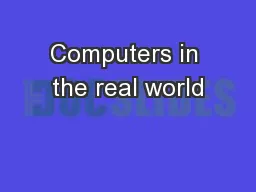PPT-Computers Are Your Future
Author : lois-ondreau | Published Date : 2015-10-06
Twelfth Edition Chapter 1 Computers and You Copyright 2012 Pearson Education Inc Publishing as Prentice Hall 1 Computers and You Copyright 2012 Pearson Education
Presentation Embed Code
Download Presentation
Download Presentation The PPT/PDF document "Computers Are Your Future" is the property of its rightful owner. Permission is granted to download and print the materials on this website for personal, non-commercial use only, and to display it on your personal computer provided you do not modify the materials and that you retain all copyright notices contained in the materials. By downloading content from our website, you accept the terms of this agreement.
Computers Are Your Future: Transcript
Download Rules Of Document
"Computers Are Your Future"The content belongs to its owner. You may download and print it for personal use, without modification, and keep all copyright notices. By downloading, you agree to these terms.
Related Documents














